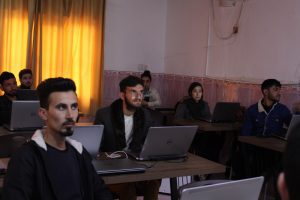UCF Student Serving Survivors of Genocidal Violence

By Léa Faure
Sinjar Academy, based in the Sinjar region of Northern Iraq, provides educational services to Yezidis and other minorities affected from the 2014 genocide. It is a community that emerged from a grassroot organization aiming to help students develop different skills via various courses: computer programming, filming, transitional justice, and their most recent and ambitious one, the English program.
A UCF undergraduate student, Myli Sangria, is at the heart of this project and one of its leaders in teaching English. She is a sophomore student at the Burnett Honors College and an officer at the Translation Society of UCF, majoring in English Literature and Legal Studies with a deep interest in Kurdish Studies.
With the guidance of Tyler Fisher, Ph.D., Sangria and seven other UCF students participated in the offering of an English language course at Sinjar Academy in June 2022. The program has teachers proficient in Kurmanji, the dialect of Kurdish spoken by most Yezidis, and Arabic. Volunteers such asSangria Sangria lead group discussions in English about different topics.
Sangria admired her students’ great work ethic despite the widespread challenges they faced. She and other volunteers aimed to motivate students and help them produce podcasts. Many of them were Yezidis displaced by violence.
The curriculum Sangria and her team established will serve generations to come. Sangria emphasized that their involvement involves solidarity not charity, and they help all participants develop mutual empathy and new horizons.
The students brought their own life stories and experiences to the Academy. As Sangria noted, students had various ethnic and religious identities and different positions on salient political issues including the Kurdish unity, the reasons for the genocidal violence in 2014, and dynamics of co-existence. The Sinjar Academy provides a platform for all these students by allowing them to discuss the issue if they wish in a civil setting. Accordingly, teachers and volunteers give everyone a voice and do not prioritize one narrative over the other. Sangria observed how learning to do that and helping students feel hear and seen is rewarding. That helped both teachers, volunteers and students to develop a sense of community.
Sangria will continue volunteering for the second round in mid-October 2022. She also invites other UCF students to participate in the Sinjar Academy. Volunteers do not need to speak Kurdish or Arabic and can adjust their expectations based on the level of the students.
Sangria encourages people to reach out to them with any questions at sinjaracademyvolunteers@gmail.com or to visit their website for more information: https://www.sinjaracademy.org. Overall, even telling people about Sinjar Academy, retweeting and sharing their story will help the program grow.
